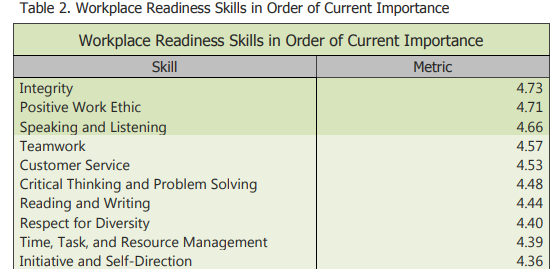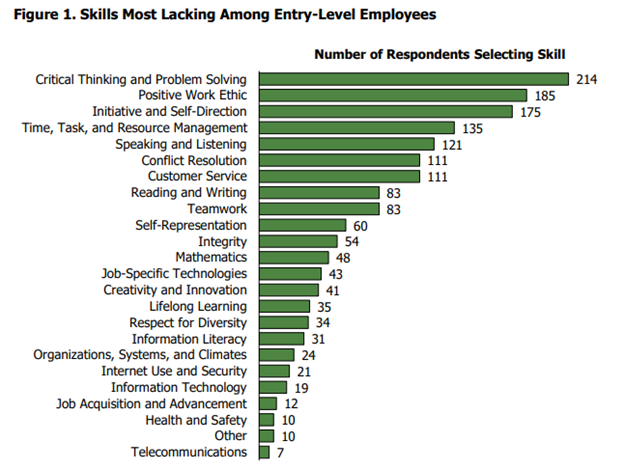Workplace Readiness Skills in Virginia
This survey was conducted in 2017 for the Office of Career, Technical, and Adult Education to identify and update the skills that are most valuable to the state’s employers. Virginia’s Workplace Readiness Skills are a set of personal qualities, people skills, and professional abilities identified by Virginia employers and educators as essential for employee success in the workplace. They have been developed and recorded over the last 20 years to include hard and soft skills such as positive work ethic, critical thinking and problem solving, and job-specific technologies, among others.
This research consisted of three stages: 1) reviewing relevant literature to identify and understand changing workplace trends; 2) analyzing various state and national workplace readiness skill frameworks to evaluate how Virginia’s framework compares; and 3) conducting a survey of Virginia employers and workforce professionals to get their feedback about which workplace readiness skills are most critical for entry-level workers to have, now and in the future.
A review of over 70 reports, publications, websites, and other sources found that the following six trends have had a significant impact on the skills todays workers need:
- Information revolution
- Automation
- Globalization
- Rapid and continuous innovation
- Organizational restructuring
- Time- and power-shifting (major advancements in communication technology, such as email and video-conferencing, which soften the boundary between work and personal life)

In 2017, nearly 2,400 Virginia employers and workforce professionals were invited to share their opinions about Virginia’s Workplace Readiness Skills by participating in a brief online survey. Nearly 400 invitees responded and completed the required portion of the survey. The tope five skills identified as “extremely important” are: integrity, positive work ethic, speaking and listening, teamwork, and customer service. Mathematics and job acquisition and advancement ranked lowest, as only “moderately important.” When asked to predict the most important skills for future workers in five years, participants identified the following as “more important in the future”: critical thinking and problem solving, information technology, initiative and self-direction, information literacy, and creativity and innovation. The survey’s predicted skills largely correspond with the skills identified in the state and national literature.

The top three skills respondents found most lacking among current entry-level workers are critical thinking and problem solving, positive work ethic, and initiative and self-direction. The complete set of new Workplace Readiness Skills for the Commonwealth can be found in the report.
For the full report and related content, download the files below.


